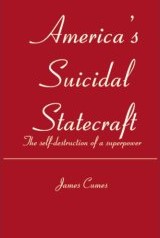|

 Civilisations die from suicide, Civilisations die from suicide,
not by murder." Arnold J. Toynbee
The Self-Destruction of a
Superpower:
Preface to America`s
Suicidal Statecraft /
Vorwort Deutsch
Book Description / Table Of Contents / About the Author
In July 1969, when Neil Armstrong took his first steps on the Moon, his great leap for mankind was uniquely an American achievement.
American vision and management, American science and technology, American finance and investment, American skill and diligence, American will, planning and dedication accomplished what was arguably
the greatest human achievement of the 20th century – perhaps of all time thus far – and America and Americans stood alone as the only country and the only people who could have done it.
Yet it came just at a point when, as the passing years have increasingly demonstrated, American power had begun to wane. In
retrospect, what was a peak of human achievement at that time was also a peak in American power.

Globalisation and Derivatives
By James Cumes / Paper submitted to the 3rd International Conference “Development in Economic Theory and Policy”,
Bilbao, 6th - 7th July, 2006
The Indigent Rich & The Rate of Interest
Remarks by James Cumes on the Occasion of a New Book
On Creditary Structures by Geoffrey W. Gardiner, 4.5.2006
A Hamilton Project and the Victory Over Want
By James Cumes, 6.5.2006 / The Hamilton Project
Victory Over Want and the Four Freedoms
By James Cumes / About the author
(previously released in "On Line Opinion", February 2002)
Economic Works by James Cumes
Prologue to “The Multiple Abyss”
Copyright & with friendly permission by James Cumes, 17 May 2004
The US Dollar, Inflation and the Outlook for 2004
Inflation, Stagflation and Unemployment
 James Cumes James Cumes
The Human Mirror
The Narcissistic Imperative
in Human Behaviour
The Rise and Fall of Empires
So, from our earliest days, we will be, consciously or otherwise, engaged in a search for - or will hope to chance upon - those things
that we ourselves value highly. We will seek to avoid - or will, by chance, be repulsed by - those things that are unfamiliar to us or which
, because we associate them with "bad" experiences, we value less. Maturity will consist, not in elimination of the self, but a more expert
search for it. Maturity will consist, not in total, inward-looking self-obsession as in autism, but in seeking the self manifested in other, external objects.
That is what narcissism really is. Past definitions have led us astray. It is not the absorption of the self in an identification of other objects as being the self, but the seeking of the self through and as manifested by
other objects. As we shall see, that was the true experience of Narcissus. He did not see his reflection as an image of himself. In falling in love with that image, he believed himself to be in love with
another. He was distraught because, though the image approached and seemed to welcome him, it disappeared when he touched it. Having refused all other suitors, he now became obsessed, as a suitor himself,
with an image identical with himself; but this image he saw as and believed to be another person.
If, as can reasonably be postulated, that is the true narcissism, is it a
disease, a mental or spiritual aberration, a manifestation of immaturity or is it a natural and ineradicable part of man's personality, dominating
our sexual lives, our mating instincts, our concepts of the society in which we want to live, our attitudes to race and our evolution to what we might - diversely - regard as higher forms? Does it, perhaps
through the perfect cloning of the physical self, ultimately offer man the only or best chance he will ever have of immortality? - These are the matters we will now look at more closely.
 |

|



